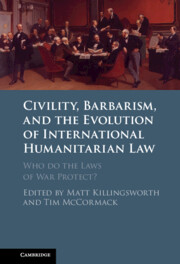 Civility, Barbarism and the Evolution of International Humanitarian Law
Civility, Barbarism and the Evolution of International Humanitarian Law Published online by Cambridge University Press: 11 January 2024
Sieges were central to the evolution of customary laws of war in early modern Europe and represented the most regularised form of warfare. They were also where civilians were most at risk of exposure to the violence of conventional war, including the phenomenon of sack. A besieging force that stormed a town had the right to put the garrison to the sword and to sack the town. Yet the long tradition of sack has been neglected by historians, only now emerging as a subject of study in its own right. This chapter explores the history of sieges, sack, and the laws of war in Western Europe over the course of the long eighteenth century (1660–1815). It highlights sieges as an important but relatively neglected place for examining changes and continuities in customary laws of war, ideals of barbarity and civility, and moral sentiment over the long eighteenth century.
To save this book to your Kindle, first ensure no-reply@cambridge.org is added to your Approved Personal Document E-mail List under your Personal Document Settings on the Manage Your Content and Devices page of your Amazon account. Then enter the ‘name’ part of your Kindle email address below. Find out more about saving to your Kindle.
Note you can select to save to either the @free.kindle.com or @kindle.com variations. ‘@free.kindle.com’ emails are free but can only be saved to your device when it is connected to wi-fi. ‘@kindle.com’ emails can be delivered even when you are not connected to wi-fi, but note that service fees apply.
Find out more about the Kindle Personal Document Service.
To save content items to your account, please confirm that you agree to abide by our usage policies. If this is the first time you use this feature, you will be asked to authorise Cambridge Core to connect with your account. Find out more about saving content to Dropbox.
To save content items to your account, please confirm that you agree to abide by our usage policies. If this is the first time you use this feature, you will be asked to authorise Cambridge Core to connect with your account. Find out more about saving content to Google Drive.